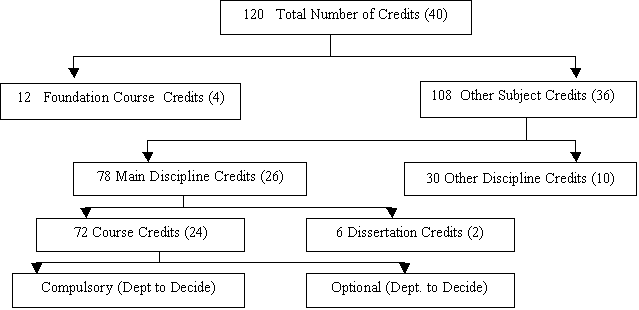

 Faculty of Arts
Faculty of Arts
| Marks | Grade | Minimum Grade Point | Comments |
|---|---|---|---|
| 100-80 | A/A+ | 4 | Superior |
| 79-70 | A- | 3.7 | |
| 69-65 | B+ | 3.3 | Exellent |
| 64-60 | B | 3.0 | |
| 59-55 | B- | 2.7 | |
| 54-50 | C+ | 2.3 | Pass |
| 49-45 | C | 2.0 | |
| 44-40 | C- | 1.7 | |
| 39-35 | D+ | 1.3 | Weak Pass |
| 34-30 | D | 1.0 | |
| 29-00 | F | 0.0 | Fail |
| ---- | I | --- | Incomplete |
| Year | Semester | Special Degree (4 Years) | General Degree (3 Years) | ||
|---|---|---|---|---|---|
| Courses | Credits | Courses | Credits | ||
| 1 | 1 | 3 Subjects | 9 | 3 Subjects | 9 |
| 2 Foundation | 6 | 2 Foundation | 6 | ||
| 1 English | 3 | 1 English | 3 | ||
| 2 | 3 Subjects | 9 | 3 Subjects | 9 | |
| 2 Foundation | 6 | 2 Foundation | 6 | ||
| 1 English | 3 | 1 English | 3 | ||
| 2 | 3 | 5 Subjects | 15 | 5 Subjects | 15 |
| 1 English | 3 | 1 English | 3 | ||
| 4 | 5 Subjects | 15 | 5 Subjects | 15 | |
| 1 English | 3 | 1 English | 3 | ||
| 3 | 5 | 5 Subjects | 15 | 5 Subjects | 15 |
| 1 English | 3 | ||||
| 6 | 5 Subjects | 15 | 5 Subjects | 15 | |
| 1 English | 3 | ||||
| 4 | 7 | 4 Subjects
+ 1 (diss.) |
15 | ||
| 8 | 4 Subjects
+ 1 (diss.) |
15 | |||
| Total | 40 | 120 | 30 | 90 | |
| Total with English | 46 | 138 | 34 | 102 | |
Note


| Course Code | Grading |
|---|---|
| ESL 101 | Lower Intermediate |
| ESL 103 | Intermediate |
| ESL 105 | Upper Intermediate |
| ESL 107 | Advanced |
Faculty of Arts, University of Peradeniya,
Peradeniya, Sri Lanka
+94 81 2392503
dr.admin@arts.pdn.ac.lk